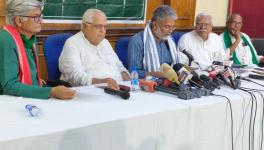Access to COVID-19 Medical Products: All Eyes on TRIPS Council

This October, amidst rising numbers of COVID-19 infections and deaths, the Indian and South African governments put forward a bold proposal to the World Trade Organisation’s (WTO) TRIPS Council, asking members to support a waiver of intellectual property requirements for COVID-19 medical products. WTO’s Agreement on Trade Related Aspects of Intellectual Property (TRIPS Agreement) is the international treaty that requires its member countries to implement certain requirements on intellectual property (IP) such as patents, industrial design and copyright.
The two countries have proposed that requirements to grant or enforce IP be waived for medical products related to COVID-19, such as medicines, vaccines, masks and ventilators, so that a scale-up of life-saving medical tools is possible without delay. Over 90 countries have welcomed or supported the proposal in some form, with Kenya and Eswatini co-sponsoring the proposal.
Several UN agencies, including UNAIDS and UNITAID have issued statements welcoming the waiver. The international humanitarian organisation Medecins Sans Frontieres (MSF), and Drugs for Neglected Diseases Initiative (DNDi) urged countries to support the proposal without delay.
The proposal will be discussed in detail on November 20 in an informal meeting of the TRIPS Council. The countries would come with their positions having discussed for nearly a month with stakeholders. It will be interesting to see who stands for public interest and who doesn’t.
The proposal was earlier discussed during the WTO TRIPS Council meeting held on October 15-16. Three blocks emerged during the discussions. An overwhelming number of least developed and developing countries welcomed or supported the proposal realising that it will be more difficult for them to access the much-needed medical products than for the wealthier governments. The wealthier nations have already captured 80% of the supply of vaccines anticipated from multinational corporations such as Pfizer and Moderna even before they hit the market and developing countries need to push for scale-up of production from alternative manufacturers.
On the other side, countries like Switzerland, Japan and the US may oppose the text to support their lucrative pharmaceutical industries that are heavily dependent on IP to block competition to ensure market exclusivities and exorbitant profits across the globe. A few countries agreed with the proposal in principle but asked for certain clarifications.
According to procedure, a formal session of the TRIPS Council is expected in early December, and a report of the discussions will be submitted to the WTO General Council at the General Council session on December 16-17.
Till then India, South Africa and other countries that support the proposal have a humongous task ahead of turning the tide in their favour. They could do it in 2003. They should be able to do it now.
They say history repeats itself. The global health movement is at the same juncture where it was 20 years ago. The 1995 TRIPS Agreement gave numerous benefits on a platter — in the form of intellectual property monopolies — to multinational corporations of the developed countries. Hit hard by patent monopolies introduced as a result of an international agreement under the aegis of the WTO, developing countries started to put up a strong challenge, especially with regard to their right to access to affordable generic medicines for their people. At the time, patents on HIV medicines, held by big pharmaceutical corporations, led to monopolies on their supply and unaffordable pricing at $10,439 per person per year, placing them out of reach of governments and people living with HIV.
Realising these challenges, in 2003, countries like India, worked with other like-minded developing countries in demanding that governments could use health and public interest safeguards to protect public health and access to medicines for their people. Finally, members of the WTO adopted the Doha Declaration on TRIPS Agreement and Public Health, also known as TRIPS flexibilities in general parlance.
The TRIPS flexibilities gave options to governments to take measures to overcome the monopolies of companies on medicines to protect the right to health and address health needs. These measures include compulsory licences that give governments a right to allow generic competitors to enter the market and supply health systems, which increases access for people who could not ordinarily afford exorbitantly priced patented medicines. Medicines produced by Indian generic companies saved millions of lives not just in India, but also in the worst-hit African, Asian, and Latin American nations.
In the COVID-19 pandemic, governments and treatment providers are finding themselves in a similar situation. The pandemic has thrown up new, and probably tougher, challenges. It is being argued by the opposers of the India-South Africa proposal that IP promotes innovation. This has been a long-standing argument in favour of IP protection, promoting stricter and more stringent laws. But evidence points to a different reality.
Today, governments are funding the pipeline of medicines, diagnostics and vaccines for COVID-19 and many of the innovations pharmaceutical corporations will commercialise are scientific breakthroughs originating in public labs and funding around the world. Governments are not only funding research and development but they are even investing into the scale-up of manufacturing facilities around the world. This public leadership and investment is not driven by the existence of IP but rather by what it should be – an effort to provide their health systems with the medical tools to prevent and treat COVID-19.
The waiver and existing TRIPS flexibilities are not mutually exclusive. Countries should continue to use TRIPS flexibilities to safeguard public health, including issuing compulsory licenses and making limitations or exceptions to exclusive rights. However, TRIPS flexibilities allow for a product-by-product, country-by-country solution to break monopolies resulting from IP which could be limiting during the pandemic. The benefits would not be global but restricted to one country who have utilised the flexibility.
The world needs masks, ventilators, diagnostic reagents, new medicines and vaccines at an unprecedented scale. Many parts of the globe are already facing shortages of such products. For example, N95 masks, that offer much better protection than surgical masks against COVID-19 to healthcare workers, have hundreds of patents on them by the multinational company 3M, and other entities. Shortages of N95 masks for healthcare workers have been reported from across the world, putting lives in danger. In March 2020, the Governor of Kentucky in the United States called on 3M to release their patents so that more manufacturers can start producing them. IP barriers have to be dispensed with.
COVID-19 is highlighting that the market-driven business-as-usual approach towards health and pharmaceuticals has flaws that need to be addressed with bold solutions. It is a good time to demand a rethink of IP regimes that do not allow alternate suppliers to scale-up production and supply of life saving medical products for the sake of preserving enormous profits that multinational corporations have been allowed to amass by blocking competition.
The pandemic has led to a global economic crisis. Countless people have lost their lives, livelihoods and income. Various estimates suggest a recovery from this slump will take years. This is not the time to let corporations make a windfall in the name of COVID-19.
Countries opposing the proposal would do well to act in global solidarity and allow the waiver of intellectual property prioritising lives of people over the vested interest of their multinational corporations.
The writer works as Advocacy Officer, MSF Access Campaign. The views are personal.
Get the latest reports & analysis with people's perspective on Protests, movements & deep analytical videos, discussions of the current affairs in your Telegram app. Subscribe to NewsClick's Telegram channel & get Real-Time updates on stories, as they get published on our website.
























